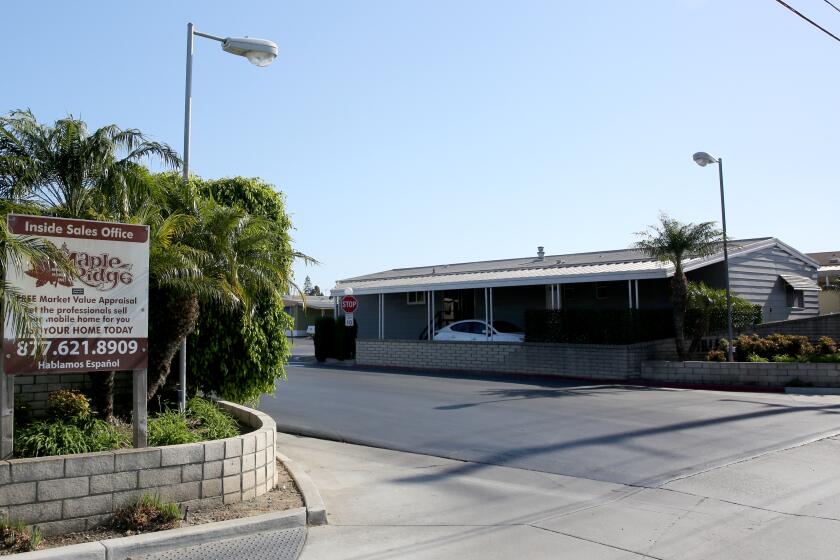Costa Mesa advances new rules for local group and sober-living homes
- Share via
Costa Mesa City Council members moved ahead Tuesday with a host of revisions to regulations governing local group and sober-living homes — including new rules aimed at increasing transparency and preventing occupants who are evicted or otherwise involuntarily discharged from becoming homeless.
The alterations, approved on a 3-2 vote with members Allan Mansoor and Jim Righeimer opposed, will go back to the council for additional review and final adoption at a future meeting.
It took almost 2 ½ hours of public comment and council discussion for a majority of council members to reach consensus on the changes.
They include new requirements aimed at keeping former sober-living residents from becoming homeless.
Under the council’s directive, operators would have to notify a resident’s contact of record if he or she is involuntarily discharged from a group or sober-living home, which generally house recovering drug addicts and alcoholics who are considered disabled under state and federal law.
Council members also agreed that operators of group homes with six or fewer residents in single-family neighborhoods should have to make transportation available so residents who are involuntarily removed can get back to their permanent addresses or the ones listed on their driver’s licenses.
Operators of group homes in areas of multifamily residences are already required to do that.
Operators also would have to contact both the city’s Network for Homeless Solutions and the Orange County Health Care Agency’s OC Links Information and Referral Line to determine what services might be available and share that information with the removed resident.
The council also agreed to implement new transparency rules requiring full disclosure of the ownership interests of group and sober-living homes. Those applying to open such facilities in the city also would have to divulge whether they’ve held a similar license or permit elsewhere and whether it ever was suspended or revoked.
Such requirements are already in place in neighboring Newport Beach, according to city staff.
“I do think it’s important that we know who all the players are so we know who we’re dealing with and we’re able to manage the situation,” said Costa Mesa Mayor Katrina Foley.
The council’s recommended revisions largely maintain the city’s rules governing how close sober-living facilities can be to one another in residential areas.
In 2014, the council adopted an ordinance requiring that sober-living homes with six or fewer occupants in single-family neighborhoods be at least 650 feet apart. Similar rules for such homes in multifamily areas followed the next year.
City officials say the goal is to prevent sober-living facilities — which critics contend can disrupt neighborhoods, increase crime and noise and contribute to parking and traffic problems — from clustering too close together in residential areas.
Though they didn’t do away with the distance requirement, a majority of council members agreed it was important to give themselves and the Planning Commission leeway to allow a smaller buffer in certain cases.
“I think it makes sense as a guideline, but I do think we need to retain that discretion,” Councilman John Stephens said. “I think it’s in the best interest of the city and it makes this ordinance way, way stronger.”
Righeimer disagreed, saying the distance requirement “should be a bright line” that’s clearly defined and enforced.
The council opted not to move forward with some recommendations the Planning Commission made last month, including that the city prohibit more than one probationer or parolee from living in a single sober-living home at one time.
City staff had warned that provision likely would be preempted by state law.
Council members also set aside another commission suggestion to require operators to pay a transient occupancy tax — typically charged for motel and hotel rooms — on stays shorter than 30 days in group homes or licensed alcohol and drug treatment facilities in residential areas.
The council directed staff to look at that idea further and return with additional information at a future meeting.
Council members also didn’t support a staff recommendation to allow facilities with at least seven residents in multifamily areas to operate with a minor conditional use permit, which can be granted at the administrative level.
Currently, those need a full conditional use permit that the Planning Commission must approve.
Some council members and residents said the staff proposal would have made it more difficult for the public to comment on specific applications.
“There’s nothing minor about the impact to our neighborhoods from bad operators,” resident Robin Leffler said.
Twitter @LukeMMoney
All the latest on Orange County from Orange County.
Get our free TimesOC newsletter.
You may occasionally receive promotional content from the Daily Pilot.




